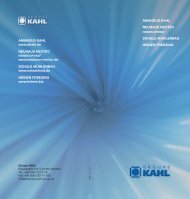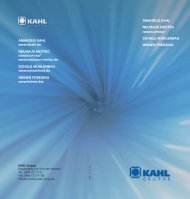Subsidiaries - Amandus Kahl Group
Subsidiaries - Amandus Kahl Group
Subsidiaries - Amandus Kahl Group
You also want an ePaper? Increase the reach of your titles
YUMPU automatically turns print PDFs into web optimized ePapers that Google loves.
sChulE<br />
BIOETHANOL – HIGHER PROFIT WITHOUT SHELL<br />
Ethanol that has been made exclusively from biomass (renew-<br />
able carbon carriers) or from the biodegradable fractions of<br />
waste products, and which is destined for use as biofuel or for<br />
alcohol production is referred to as bioethanol. Like conven-<br />
tional alcohol, ethanol is obtained by (alcoholic) fermentation<br />
of sugar with the action of microorganisms, and then purified<br />
by thermal separation processes. The raw materials used are<br />
mostly locally available plants with high contents of sugar or<br />
starch: In Europe, these are wheat and sugar beet. Starch-con-<br />
taining raw materials such as cereals are ground. By means of<br />
enzymatic decomposition, starch is converted into sugar dur-<br />
ing liquefaction /saccharification.<br />
nigeria occupies second place in the ranking of the world's<br />
greatest rice importers. The annual rice consumption amounts<br />
to 3.5 million tons, with about 1.5 million tons being imported.<br />
In recent years, it became more and more obvious that nigeria<br />
is highly dependent on rice-exporting countries and has to put<br />
up with a tremendous price volatility on the global market. As a<br />
consequence, the poorest could no longer afford the drastically<br />
increased prices for rice, which caused considerable tension in<br />
the country. On the other hand, nigeria has sufficient arable<br />
land that could be cultivated for rice production, so that the<br />
country might completely abandon the import of rice. Further-<br />
more, due to poor technical standards in the areas of harvest-<br />
ing, drying, storage, and processing in the rice mills, about 30<br />
to 50 % of the local rice harvest is lost every year.<br />
For the future, the government plans a massive promotion of<br />
local rice cultivation and treatment processes by modernising<br />
technical equipment. For this purpose, large-scale promotion<br />
programmes are provided. For more than 50 years, Schule have<br />
supplied parboiling plants and rice mills to nigeria and other Af-<br />
rican countries. At the moment, a turnkey rice processing plant<br />
In the Verticone shelling machines by Schule, wheat or barley<br />
are shelled prior to grinding, which means the outer shell lay-<br />
ers containing only crude fibres (non-fermentable substances)<br />
are removed. As a consequence, the quantity to be treated in<br />
the thermal separation process is reduced so that less energy<br />
is required for cooking, distillation and drying, which increases<br />
the economic efficiency of the process.<br />
In existing plants, in which for example barley with a shelling<br />
degree of about 10 %, is processed, an increase of 10 to 15 % of<br />
the throughput quantity and a higher efficiency can be achieved<br />
by means of pre-shelling.<br />
NIGERIA – PROMOTION AND DEVELOPMENT OF AGRICULTURAL RESOURCES<br />
with a parboiling plant and a rice mill is being assembled in<br />
the north of nigeria. When the plant was designed, particular<br />
attention was paid to a sturdy design of the machines and to a<br />
control system that is adapted to the local personnel. Economic<br />
efficiency was an important aspect in the project realisation.<br />
This plant is an important contribution to the promotion of the<br />
rice industry. Technically, the plant is able to convert locally cultivated<br />
paddy rice into rice with a final quality comparable to<br />
that of imported rice – without any loss during processing. The<br />
supply of further plants might help processing the available agricultural<br />
resources more gently so that they may contribute to<br />
achieve food security. At present, further orders for the modernisation<br />
/extension of existing Schule rice processing plants<br />
are being processed and will be completed shortly. With their<br />
experience in the fields of drying, cleaning, and parboiling and<br />
rice milling technology, Schule is an important partner for the<br />
nigerian rice industry.<br />
Fig. 1 Verticone shelling machine<br />
1 2<br />
Fig. 2 parboilingplant<br />
34/35











